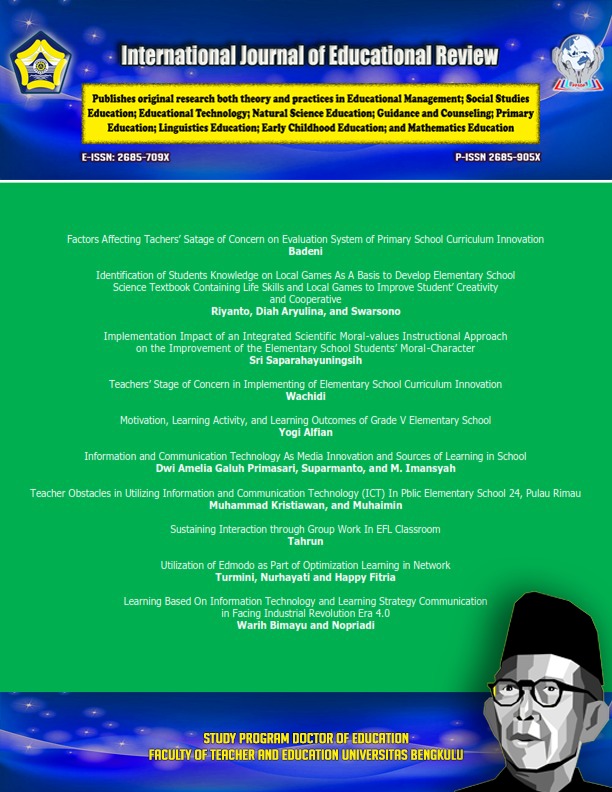Public Relation Management in Developing Organizational Behavior
DOI:
https://doi.org/10.33369/ijer.v2i1.10380Abstract
This research described basically and found out concept of public relation management in order to determine how the public relation management in developing organizational behavior. This research was located in State Islamic Senior High Schools in Jambi Province consisting of MAN 1 Jambi, MAN 1 Batanghari, and MAN 1 Tebo. This research is qualitative descriptive research. Data collection techniques were using observation, interview and documentation. Data analysis used combined Miles Huberman and John Creswell model. Data validity technique used data triangulation. Results of the research show that public relation management can be seen from implementation of small group communication planning, execution of special events of public relations, media use, and evaluation on Islamic school program. Organizational behavior can be seen from mutual communication with the society, adjustment on public needs, support by the society and clear targets. Conclusion of this research shows that the public relation management can develop organizational behavior in State Islamic Senior High Schools in Jambi Province. Implication of this research shows that the public relation management can develop the organizational behavior.References
Abdul A. (1998). Understanding Social Phenomena Through Case Studies: A Collection of Qualitative Method Training Materials. Surabaya: BMPTSI Wilayah VII Jawa Timur
Agustinus Hermino. (2013). School Organization Organizational Needs Assessment. Jakarta. Gramedia.
Apriana, D., Kristiawan, M., & Wardiah, D. (2019). Headmaster’s Competency In Preparing Vocational School Students For Entrepreneurship. International Journal of Scientific & Technology Research, 8(8).
Cepi Triatna. (2015). Organizational Behavior in Education. Bandung: PT. Remaja Rosdakarya.
Danang Sunyoto & Burhanudin. (2015). Organizational Behavior Theory, Equipped: Organizational Development Interventions. Yogyakarta: Center Of Academic Publishing Service (CAPS).
Dean Kruckeberg. (2014). The Future of PR Education: Some Recommendations. Journal Public Relations Review. Vol. 24, No. 2.
E. Syarifudin. (2011). Education Management. Jakarta: Diadit Media.
Erica Weintraub Autin & Bruce E. Pinkleton. (2006). Strategic Public Relations Management; Planning and Managing Effective Communication Programs. London. Laurence Erlmbaum Associates (LEA).
Fatah, S. (2011). Management of Education Based on Madrasas. Semarang: Pustaka Rizki Putra.
Fathurrochman, I., Budiman, D. A., Alamsyahril, & Kristiawan, M. (2019). Revitalization Management of Islamic Boarding School Preventing The Radicalism. Restaurant Business, (10), 495–505.
Imam, S. & Tobroni. (2003). Social-Religion Research Methodology. Bandung: Remaja Rosdakarya.
Irmayani, H., Wardiah, D., & Kristiawan, M. (2018). The Strategy of SD Pusri In Improving Educational Quality. International Journal of Scientific & Technology Research, 7(7).
Khasanah, U., Kristiawan, M., & Tobari. (2019). The Implementation of Principals’ Academic Supervision In Improving Teachers’ Professionalism in the State Primary Schools. International Journal of Scientific & Technology Research, 8(8)
Kingsley Agyapong. (2013). Educational Public Relations Functions In Private Tertiary Universities In Ghana, Interdisciplinary Journal Of Contemporary Research In Business. Vol 4, No. 11.
Kristiawan, M., Nizarani., & Syamsidar. (2019). Role of School on Forming Character of Z-Generation Through Entrepreneurial Skills. International Journal of Scientific & Technology Research, 8(10).
Lexy J. Moleong. (2016). Qualitative Research Methodology. Bandung: PT. Remaja Rosdakarya.
Maseleno, A., Ayshwary, B., Ivanova, T. N., Hashim, W., Nguyen, P. T., Shankar, K., Kristiawan, M., Huda, M. (2019). General Theoretical and Philosophical Aspects of Modern Education. Aspectos Teóricos y Filosóficos Generales de la Educación Moderna. Revista San Gregorio 2019, No. 32 Special Issues August.
Masri, S., & Sofyan E. (1994). Survey Research Methods. Jakarta. LP3ES. 1994.
Miles, M. B. & Huberman, M. (2009). Qualitative Data Analysis. Jakarta: UI Press.
Morissan. (2009). Public Relations Management: Strategies to Become Professional PR. Jakarta: Kencana.
Mukhtar, H., Risnita, D., & Darwani, H., (2018). Benchmarking Leadership In Lecturers’careers Development Of Private Islamic Higher Education In Jambi Province. International Journal of Research Granthaalayah. ISSN 2350-0530 (Online), ISSN 2394-3629 (Print), Volume. 6 (11).
Onong, U. E. (2012). Public Relations A Communicological Study. Bandung: PT. Remaja Karya.
Onong, U. E. (2003). Human Relation and Public Relations. Bandung. Mandar Maju.
Patrick Jackson, Stacey Smith, and Fran R. Stansberry. (2006). Public Relations Practices, 7th ed. Upper Saddle River. NJ: Pearson.
Rhenald, K. (1994). Manajemen Public Relations: Concept and Application in Indonesia. Jakarta: Grafiti.
Robbins P. Stephen. (2011). Organizational Behavior The Concept of Application Controversy. Jakarta: Prenhallindo.
Robert, K., & Angelo, K. (2010). Organizational Behavior; Ninth Edition. New York. Mc Grow Hill.
Robert, K., & Angelo, K. (2014). Organizational Behavior. Jakarta: Salemba Empat.
Rosadi, R. (2016). Public Relations and Media Communication Management; Conception and Application. Jakarta: PT Raja Grafindo Persada.
Scott, M. C. (2010). Effective Public Relations; Designing and Implementing Public Relations Activities Successfully. Jakarta: INDEKS Kelompok Gramedia.
Shahram, G. (2013). The Impact of Public Relations Performances on Market Share of Firms: Case Study: Power Battery Manufacturing In Isfahan, Interdisciplinary Journal Of Contemporary Research In Business. Vol. 5, No. 5.
Soekarto, I. (2014). How to Familiarize Schools and Communities. Malang: UM Malang.
Sugiyono. (2009). Understanding Qualitative Research. Bandung: Alfabeta.
Sumantra, G. (2005). Bad Management Theories Are Destroying Good Management Practices, Academy of Management Learning & Education. Vol. 4, No. 1.
Syamsir, T. (2013). Organization & Management: Behavior, Structure, Culture & Organizational Change. Bandung: Alfabeta.
Tilaar, H. A. R. (2002). Indonesian Cultural and Civic Education; National Education Reform Strategy. Bandung: Remaja Rosdakarya.
Tobari., Kristiawan, M., & Asvio, N. (2018). The Strategy of Headmaster on Upgrading Educational Quality In Asean Economic Community (AEC) Era. International Journal of Scientific & Technology Research, 7(4).
UU. RI. No. 20 of 2003. National Education System. Jakarta: Asa Mandiri.
Wahyosumidjo. (2005). Principal Leadership; Theoretical Review and Problems. Jakarta: PT Raja Grafindo Persada.
Wandasari, Y., Kristiawan, M., & Arafat, Y. (2019). Policy Evaluation of School’s Literacy Movement on Improving Discipline of State High School Students. International Journal of Scientific & Technology Research, 8(4).
Yamin, T., & Risnita, W. (2016). The Relationship between School Cultures and the Principal’s Leadership Style and the Effectiveness of the Principal’s Leadership. International Journal of Scientific Research and Management, ISSN (e): 2321-3418, Volume. 4, Issue. 10.
Zulkarnain Nasution. (2010). Public Relations Management in Educational Institutions: Concepts, Phenomena, and Applications. Malang: UMM Press.
Downloads
Published
How to Cite
Issue
Section
License

This work is licensed under a Creative Commons Attribution-ShareAlike 4.0 International License.




